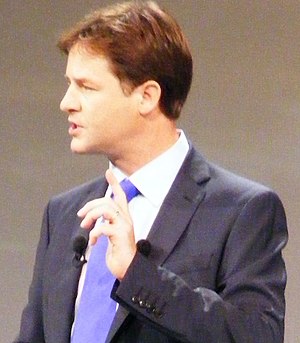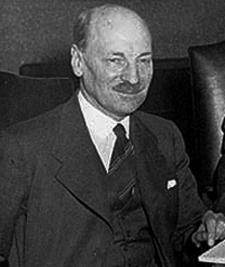 Image via Wikipedia
Image via WikipediaThey talked about a 'Lib Dem bubble' and about whether or not it would burst. Well, if these polls are to be believed, it certainly has. The question then is, 'why?' I've seen a few places online suggest that it has to do with Lib Dem foreign policies, as revealed during the second debate. Maybe. But then again, there's that same old bugaboo, what you might call 'electability'.
The poll that really matters, then, is the one released by YouGov, showing that 49% of voters would vote Lib Dem if they thought they had a reasonable chance of forming the government.
That's an amazing stat, one that bears consideration. 49% - half the electorate. You have to go back to the 1950s to see a single party capturing shares of the electorate that high. And furthermore, the 49% comes from all across the political map: not just undecideds and decided Lib Dems, but decided Labour supporters and decided Tory supporters too.
What does this mean? Well, though it's not quite worded as one, it's the closest you'll get to a true 'self-fulfilling prophecy'. A 'self-fulfilling prophecy' is what happens when belief in a certain outcome causes that outcome to happen. A classic example is the collapse of a smaller bank: if a rumour can be started that a certain bank is having economic problems, a worried populace will withdraw their savings from that bank, in effect causing the economic probilems, and ultimate failure, that they had feared would happen (and that would not have happened had they not done so). In effect, the rumour itself causes the effects it describes to happen.
Online vote predictors are, of course, far from 100% accurate. But putting the numbers from the YouGov poll (in full: Lib Dem: 49%, Tories 25%, Labour 19%) into any of them produces a solid, in fact ridiculously so, majority for the Lib Dems. http://ukpollingreport.co.uk/blog/swing-calculator gives the following result: 548 seats for the Lib Dems, compared to 41 for Labour and 28 for the Conservatives. 15 for other parties and 18 Northern Irish seats fail to make this potential scenario anything but a landslide.
So here's the crux: if everyone who would vote Lib Dem if they had a chance of forming the government did vote Lib Dem, they would have a chance of forming the government. More than a chance, in fact, a virtual certainty.
So why isn't Nick Clegg riding a tsunami into Number 10, then? Why do his current polls differ from this theoretical-situation poll so drastically?
Well, on the one hand it's an obvious referendum on the people's faith in the current British electoral system: it shows a good deal of people making voting decisions based on the concept of a skewed outcome. But additionally it's another example of the politics of animosity in the UK political scene: that essentially you don't have people voting for Labour or the Tories so much as against them. One main reason why the historically centrist Lib Dems have so much theoretical support is that anti-Tories prefer them to the Tories, and anti-Labour voters prefer them to Labour. When people vote either to keep Brown out of office or to keep Cameron out, Clegg is appealing to either side, at least in part.
What this fails to see, however, is that there is genuine respect and admiration for Nick Clegg and his party - large amounts of it. Even people with no intention of voting for him still see Clegg as more honest and having more vision than the two 'main' candidates. While some Lib Dem policies regarding immigration, defence and Europe might genuinely raise eyebrows, the fact is that much of the Lib Dem platform is appealing to the British voter.
And if everyone in the UK woke up on the morning of 6 May saying, 'this is a genuine three-way race; I'm voting with my conscience', who knows what would come to pass?
But that would never happen.

![Reblog this post [with Zemanta]](http://img.zemanta.com/reblog_e.png?x-id=18ac46ee-887a-406b-9daf-3012a9235a0d)

![Reblog this post [with Zemanta]](http://img.zemanta.com/reblog_e.png?x-id=01aa8066-480e-4779-832f-e92abc8bd54e)